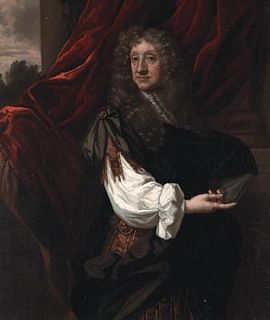John Hampden (c. 1595–1643) was an English parliamentarian and a central figure at the start of the English Civil War.

John Hampden was an English politician who was one of the leading parliamentarians involved in challenging the authority of Charles I of England in the run-up towards the English Civil War. He became a national figure when he stood trial in 1637 for his refusal to be taxed for ship money, and was one of the Five Members whose attempted unconstitutional arrest by King Charles I in the House of Commons of England in 1642 sparked the Civil War.
John Hampden may also refer to:
- John Hampden (MP) (c. 1387–c. 1459), MP for Buckinghamshire, 1420, 1437
- John Hampden (1653–1696) grandson of John Hampden; coined the term "Glorious Revolution"
- John Hampden (1696–1754) great grandson of John Hampden
Buckinghamshire is a former United Kingdom Parliamentary constituency. It was a constituency of the House of Commons of the Parliament of England then of the Parliament of Great Britain from 1707 to 1800 and of the Parliament of the United Kingdom from 1801 to 1885.

John Hampden, the second son of Richard Hampden, and grandson of Ship money tax protester John Hampden, returned to England after residing for about two years in France, and joined himself to William Russell and Algernon Sidney and the party opposed to the arbitrary government of Charles II. With Russell and Sidney he was arrested in 1683 for alleged complicity in the Rye House Plot, but more fortunate than his colleagues his life was spared, although as he was unable to pay the fine of £40,000 which was imposed upon him he remained in prison. Then in 1685, after the failure of Monmouth's rising, Hampden was again brought to trial, and on a charge of high treason was condemned to death. But the sentence was not carried out, and having paid £6000 he was set at liberty. In the Convention Parliament of 1689 he represented Wendover, but in the subsequent parliaments he failed to secure a seat. It was Hampden who in 1689 coined the phrase "Glorious Revolution". He died by his own hand on 12 December 1696. Hampden wrote numerous pamphlets, and Bishop Burnet described him as "one of the learnedest gentlemen I ever knew".
John Hampden, an English politician, was the second son of John Hampden.





